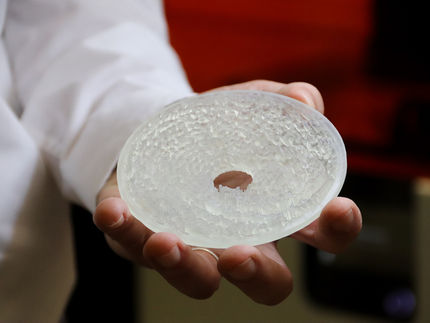Non-invasive first trimester blood test reliably detects Down's syndrome
New research has found that routine screening using a non-invasive test that analyzes fetal DNA in a pregnant woman's blood can accurately detect Down's syndrome and other genetic fetal abnormalities in the first trimester. Published online in ultrasound in Obstetrics & Gynecology, the results suggest that the test is superior to currently available screening strategies and could reshape standards in prenatal testing.
Current screening for Down's syndrome, or trisomy 21, and other trisomy conditions includes a combined test done between the 11th and 13th weeks of pregnancy, which involves an ultrasound screen and a hormonal analysis of the pregnant woman's blood. Only chorionic villus sampling and amniocentesis can definitely detect or rule out fetal genetic abnormalities, but these are invasive to the pregnancy and carry a risk of miscarriage.
Several studies have shown that non-invasive prenatal diagnosis for trisomy syndromes using fetal cell free (cf) DNA from a pregnant woman's blood is highly sensitive and specific, making it a potentially reliable alternative that can be done earlier in pregnancy.
An Ultrasound in Obstetrics & Gynecology study by Kypros Nicolaides, MD, of the Harris Birthright Research Centre for Fetal Medicine at King's College London in England, and his colleagues is the first to prospectively demonstrate the feasibility of routine screening for trisomies 21, 18, and 13 by cfDNA testing. Testing done in 1005 pregnancies at 10 weeks had a lower false positive rate and higher sensitivity for fetal trisomy than the combined test done at 12 weeks. Both cfDNA and combined testing detected all trisomies, but the estimated false-positive rates were 0.1% and 3.4%, respectively.
"This study has shown that the main advantage of cfDNA testing, compared with the combined test, is the substantial reduction in false positive rate. Another major advantage of cfDNA testing is the reporting of results as very high or very low risk, which makes it easier for parents to decide in favor of or against invasive testing," the authors wrote.
A second Ultrasound in Obstetrics & Gynecology study by the group, which included pregnancies undergoing screening at three UK hospitals between March 2006 and May 2012, found that effective first-trimester screening for Down's syndrome could be achieved by cfDNA testing contingent on the results of the combined test done at 11 to 13 weeks. The strategy detected 98% of cases, and invasive testing was needed for confirmation in less than 0.5% of cases.
"Screening for trisomy 21 by cfDNA testing contingent on the results of an expanded combined test would retain the advantages of the current method of screening, but with a simultaneous major increase in detection rate and decrease in the rate of invasive testing," the authors concluded.
Most read news
Other news from the department science

Get the life science industry in your inbox
By submitting this form you agree that LUMITOS AG will send you the newsletter(s) selected above by email. Your data will not be passed on to third parties. Your data will be stored and processed in accordance with our data protection regulations. LUMITOS may contact you by email for the purpose of advertising or market and opinion surveys. You can revoke your consent at any time without giving reasons to LUMITOS AG, Ernst-Augustin-Str. 2, 12489 Berlin, Germany or by e-mail at revoke@lumitos.com with effect for the future. In addition, each email contains a link to unsubscribe from the corresponding newsletter.

















































